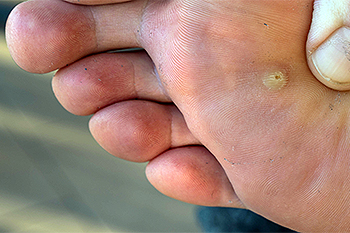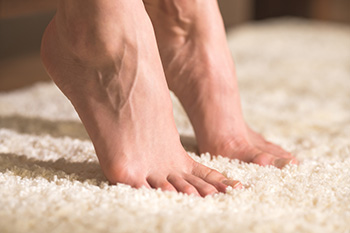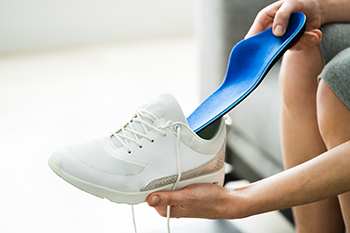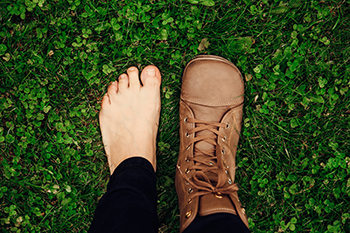
(908) 381-8160Berkeley Heights

Plantar warts are a common, but often misunderstood, skin condition that can be both uncomfortable and unsightly. These warts are caused by the human papillomavirus, abbreviated HPV, and specifically thrive on the soles of the feet, making them a unique challenge to deal with. Recognizing the symptoms is crucial for early detection and effective treatment. One of the hallmark signs of plantar warts is the appearance of small, grainy growths on the bottom of the foot. These warts may have tiny black dots, known as wart seeds within them, which are actually clotted blood vessels. Plantar warts can cause pain or discomfort, especially when pressure is applied, such as when walking or standing. These warts often have a tough, thickened layer of skin over them, making them appear flat against the foot's surface. They may also present with an irregular border and vary in color from flesh toned to brown or gray. It is essential to remember that plantar warts can sometimes be mistaken for other foot conditions, so if you suspect you have one, it is suggested that you consult a podiatrist for a proper diagnosis and appropriate treatment options.
Plantar warts can be very uncomfortable. If you need your feet checked, contact Dr. Janet Leicht from New Jersey. Our doctor will assist you with all of your foot and ankle needs.
About Plantar Warts
Plantar warts are the result of HPV, or human papillomavirus, getting into open wounds on the feet. They are mostly found on the heels or balls of the feet.
While plantar warts are generally harmless, those experiencing excessive pain or those suffering from diabetes or a compromised immune system require immediate medical care. Plantar warts are easily diagnosed, usually through scraping off a bit of rough skin or by getting a biopsy.
Symptoms
Treatment
To help prevent developing plantar warts, avoid walking barefoot over abrasive surfaces that can cause cuts or wounds for HPV to get into. Avoiding direct contact with other warts, as well as not picking or rubbing existing warts, can help prevent the further spread of plantar warts. However, if you think you have developed plantar warts, speak to your podiatrist. He or she can diagnose the warts on your feet and recommend the appropriate treatment options.
If you have any questions please feel free to contact our office located in Berkeley Heights, NJ . We offer the newest diagnostic and treatment technologies for all your foot and ankle needs.

Ankle stretches often go overlooked in daily self-care routines, but they can help you maintain healthy and functional feet. Performing simple ankle stretching exercises on a regular basis can help prevent injuries, improve flexibility, and relieve discomfort. More importantly, experts believe that such stretches significantly reduce the risk of ankle sprains and strains. By increasing the flexibility of the muscles and tendons surrounding the ankle joint, you can better adapt to sudden movements and uneven surfaces. The calf stretch exercise targets the calf muscles and Achilles tendon, further enhancing the stability and resilience of the ankle. In addition, ankle stretches may improve overall foot and lower leg flexibility. Stretching helps to reduce muscle tension and enhances mobility. The ankle alphabet exercise involves tracing the alphabet in the air with your toes. This movement encourages a full range of motion in the ankle joint and helps to relieve tension and discomfort. These exercises, and others, not only help prevent injuries but also promote flexibility and reduce discomfort. For more information on ways to reduce the risk of ankle sprains and strains, it is suggested that you make an appointment with a podiatrist.
Exercising your feet regularly with the proper foot wear is a great way to prevent injuries and build strength. If you have any concerns about your feet, contact Dr. Janet Leicht from New Jersey. Our doctor can provide the care you need to keep you pain-free and on your feet.
Exercise for Your Feet
Exercise for your feet can help you gain strength, mobility and flexibility in your feet. They say that strengthening your feet can be just as rewarding as strengthening another part of the body. Your feet are very important, and we often forget about them in our daily tasks. But it is because of our feet that are we able to get going and do what we need to. For those of us fortunate enough to not have any foot problems, it is an important gesture to take care of them to ensure good health in the long run.
Some foot health exercises can include ankle pumps, tip-toeing, toe rises, lifting off the floor doing reps and sets, and flexing the toes. It is best to speak with Our doctor to determine an appropriate regimen for your needs. Everyone’s needs and bodies are different, and the activities required to maintain strength in the feet vary from individual to individual.
Once you get into a routine of doing regular exercise, you may notice a difference in your feet and how strong they may become.
If you have any questions please feel free to contact our office located in Berkeley Heights, NJ . We offer the newest diagnostic and treatment technologies for all your foot and ankle needs.

Comfort is important when it comes to shoes for hospital workers, and safety is even more so. A cushioned insole and a well padded interior are essential in providing all day comfort during extended shifts. Standing and walking for hours can take a toll on your feet, and having shoes that offer ample cushioning can help to reduce fatigue and discomfort. Having adequate arch support and a stable midsole can help maintain proper foot alignment and reduce strain on the feet and legs. Wearing shoes that have slip resistant outsoles are a must in healthcare settings, where floors can be wet or slippery. Breathability is also essential to keep your feet dry and comfortable throughout the day. Lightweight fabrics allow air circulation, reducing the risk of sweating and odor. Finding shoes constructed with high quality materials helps ensure that your shoes can withstand daily use and the occasional spills or accidents that are part of the job. For more information on finding the right shoes for hospital workers, it is suggested that you consult with a podiatrist.
While working on the feet, it is important to take the proper care of them. For more information about working on your feet, contact Dr. Janet Leicht from New Jersey. Our doctor will treat your foot and ankle needs.
Working on Your Feet
Standing on your feet for long periods of time can cause stress and pain in your feet. Your whole body may experience change in terms of posture, back pain, bunions, callouses and or plantar warts. There are ways to avoid these conditions with proper foot care, smart choices and correct posture.
Positive Changes
Negative heeled shoe – Choosing this shoe type places the heel slightly lower than the ball of the foot. These are great for overall foot health. Find shoes that fit you correctly.
Go barefoot – Our feet were not designed to be enclosed for all hours of the day. Try to periodically expose your feet to air.
Eliminate Pain
Foot Exercises – Performing simple exercises, incorporating yoga and doing stretches are beneficial. This will allow increased blood flow to the area and muscles of the foot.
Achilles tendon – Stretching the foot out flat on the floor will relax the calf muscles and tendon. These exercises can be performed almost anywhere. Make sure you add these exercises to your daily regimen.
With a little bit of this information and knowing more about foot health, you will notice changes. Foot stretches and proper footwear will help with pain and prevent further issues.
If you have any questions please feel free to contact our office located in Berkeley Heights, NJ . We offer the newest diagnostic and treatment technologies for all your foot and ankle needs.

Proper footwear is paramount for maintaining healthy feet. Ill-fitting shoes can lead to any number of foot problems and even increase the risk of injury. To safeguard your foot health, it's important to select shoes that not only fit well but also provide adequate support. When making your choice, consider the nature of your activity, the type of surface you'll be on, and the need for proper support. For instance, people who spend substantial time on hard surfaces may be more susceptible to heel and forefoot pain, as well as calluses and corns. Supportive shoes with softer soles and arch supports may help. High heels, which force the feet into unnatural positions, can result in long-term postural changes and increase the chances of toe deformities, such as bunions. For active people, the right footwear can ensure proper shock absorption and stability. Seek sports shoes that offer flexibility at the ball of the foot and ample heel support. If foot problems develop or persist, it is suggested that you make an appointment with a podiatrist.
It is important to find shoes that fit you properly in order to avoid a variety of different foot problems. For more information about treatment, contact Dr. Janet Leicht from New Jersey. Our doctor will treat your foot and ankle needs.
Proper Shoe Fitting
Shoes have many different functions. They cushion our body weight, protect our feet, and allow us to safely play sports. You should always make sure that the shoes you wear fit you properly in order to avoid injuries and deformities such as: bunions, corns, calluses, hammertoes, plantar fasciitis, stress fractures, and more. It is important to note that although a certain pair of shoes might be a great fit for someone else, that doesn’t mean they will be a great fit for you. This is why you should always try on shoes before buying them to make sure they are worth the investment. Typically, shoes need to be replaced ever six months to one year of regular use.
Tips for Proper Shoe Fitting
The shoes you buy should always feel as good as they look. Shoes that fit properly will last longer, feel better, and improve your way of life each day.
If you have any questions, please feel free to contact our office located in Berkeley Heights, NJ . We offer the newest diagnostic and treatment technologies for all your foot care needs.